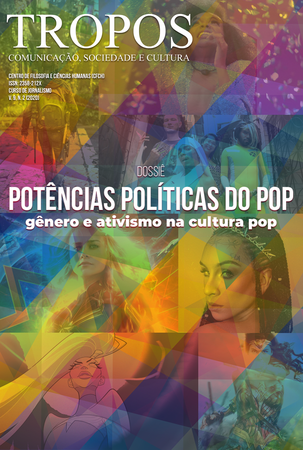DISCUTINDO GÊNERO E ALTERIDADE COM ADOLESCENTES EM ESPAÇOS SOCIALMENTE VULNERÁVEIS ATRAVÉS DA FICÇÃO CIENTÍFICA
Keywords:
Science Fiction, Gender, Cinema, Literature, Non-formal educationAbstract
This paper aims to reflect on science fiction potential, both in literature and cinema, for debating socio-cultural issues, such as gender relations and otherness. Given the popularity of the science fiction genre, and starting from the conception that individuals are not passive in the face of the symbols disseminated by the media, the potential of problematization through cultural products is recognized as a means of offering resources for contestation and opposition to a dominant discourse. To this end, two works were selected - the book “The Left Hand of Darkness”, by Ursula K. Le Guin, and the film “Arrival”, by Denis Villeneuve - for carrying out recreational activities based on the action-research methodology with adolescents from a non-formal education space. The results of these activities demonstrate how a playful approach based on cultural products stimulates the adolescents' involvement in relation to the proposed themes. Thus, by identifying the “Other alien” metaphor and recognizing otherness in marginalized groups, or by reflecting on gender issues present in an alternative world, these young people were able to reflect on social issues present in science fiction works, as well as about themselves as young people in a position of otherness due to the context of social vulnerability in which they are inserted.
Downloads
References
BEAUVOIR, Simone de. O segundo sexo: fatos e mitos / Simone de Beauvoir; tradução Sérgio Milliet. – 3. Ed. Rio de Janeiro: Nova Fronteira, 2016.
BERTH, Joice. Empoderamento. São Paulo: Pólen, 2019.
BESSON, A. N. N. E. Aux frontières du réel: les genres de l’imaginaire. La Revue des livres pour enfants, n. 274, 2013.
BRAKE, Mark; THORNTON, Rosi. Science fiction in the Classroom. Physics Education, Bristol, v. 38, n. 1, p. 31-34, 2003.
CALVIN, Ritch. Feminist Science Fiction. A Virtual Introduction to Science Fiction. Ed. Lars Schmeink. Web, 2012.
CHIANG, Ted. História da sua vida. In: História da sua vida e outros contos. Tradução de Edmundo Barreiros. Rio de Janeiro: Intrínseca, 2016.
DUSCHATZKY, Silvia; SKLIAR, Carlos. O nome do outros: Narrando a alteridade na cultura e na educação. In: Habitantes de Babel: políticas e poéticas da diferença/organização por Jorge Larrosa e Carlos Skliar; tradução de Semírames Gorini da Veiga – Belo Horizonte: Autêntica, p.119- 138, 2001.
ECO, Umberto. Os mundos da ficção científica. In: Sobre os espelhos e outros ensaios. Traduzido por Beatriz Borges. 3. Ed, Rio de Janeiro: Nova Fronteira, 1989.
FLICKER, Eva. Between Brains and Breasts—Women Scientists in Fiction Film: On the Marginalization and Sexualization of Scientific Competence. Public Understanding of Science, v. 12, n. 3, p. 307–318, 2003.
FREEDMAN, Estelle. No Turning Back: The History of Feminism and the Future of Women. New York: Ballantine, 2002.
GEORGE, Susan A. Gendering science fiction films: invaders from the suburbs. New York: Palgrave Macmillan, 2013.
GUIN, Ursula K. Le. A Mão Esquerda da Escuridão. São Paulo: Aleph, 2008.
KAPLAN, Elizabeth Ann. A mulher e o cinema: os dois lados da câmera. Tradução de Helen Marcia Potter Pessoa. Rio de Janeiro: Rocco, 1995.
KELLNER, Douglas. A Cultura da mídia – estudos culturais: Identidade e política entre o moderno e o pós-moderno. São Paulo: EDUSC, 2001.
MARTÍN-DÍAZ, María Jesús; PIZARRO, A; BACAS, P.; GARCÍA, J. P.; PERERA, F. Science fiction comes into the classroom: Maelstrom II. Physics Education, v. 27, 1992.
MARTINS, Maria Helena. O que é leitura. São Paulo: Brasiliense, 1997.
MORENO, Rachel. A Imagem da Mulher na Mídia: controle social comparado. São Paulo: Expressão Popular, 2017.
MOVIE Budget and Financial Performance Records. The Numbers. Disponível em: <https://www.the-numbers.com/movie/budgets>. Acesso em: 18 de maio de 2020.
OLIVEIRA, Fátima Régis de. Ficção Científica: uma narrativa da subjetividade homem- máquina. Contracampo, Niterói, v. 9, n. 1, p.177-198, 2º sem., 2003.
PIASSI, Luís Paulo C. A ficção científica como elemento de problematização na educação em ciências. Ciênc. educ. (Bauru), v. 21, n. 3, 2015.
PUPO, Stella Cêntula; OLIVEIRA, Tuany; GOMES, Emerson; VIEIRA, Rui; SANTOS, Emerson; PIASSI, Luís Paulo. Ciência, Tecnologia, Mídia e Igualdade de Gênero: Estratégias de Comunicação Científica. E-COM (BELO HORIZONTE), v. 10, p. 42-62, 2017.
SÃO PAULO. Prefeitura de São Paulo – Assistência Social. Norma Técnica dos Serviços Socioassistenciais: Proteção Social Básica. Prefeitura de São Paulo, São Paulo, 2012.
TAVARES, Bráulio. O que é ficção científica. 2. ed. São Paulo: Brasiliense, 1992.
VILLENEUVE, Denis; LEVY, Shawn; LEVINE, Dan; RYDER, Aaron; LINDE, David. A Chegada. Los Angeles: Sony Pictures, 2016. DVD (116 min.). Título original: Arrival.
ZIRANGUE, Rajaram S. Feminist Science Fiction: images of future women. Asian Quaterly, X, v. 7, n. 4, p.9-18, fev. 2010.
Downloads
Published
How to Cite
Issue
Section
License
Transferência de direitos autorais:
Declaro que após aprovado para publicação a Revista Tropos editada pela Universidade Federal do Acre (UFAC), passará a ter os direitos autorais do trabalho, que se tornarão propriedade exclusiva da Revista, sendo permitida a reprodução total ou parcial desde que devidamente referenciada.

